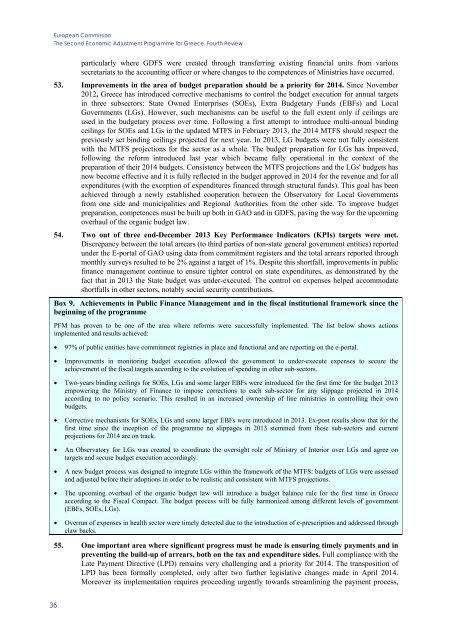ocp192_en
ocp192_en
ocp192_en
Create successful ePaper yourself
Turn your PDF publications into a flip-book with our unique Google optimized e-Paper software.
European CommissionThe Second Economic Adjustm<strong>en</strong>t Programme for Greece. Fourth Reviewparticularly where GDFS were created through transferring existing financial units from varioussecretariats to the accounting officer or where changes to the compet<strong>en</strong>ces of Ministries have occurred.53. Improvem<strong>en</strong>ts in the area of budget preparation should be a priority for 2014. Since November2012, Greece has introduced corrective mechanisms to control the budget execution for annual targetsin three subsectors: State Owned Enterprises (SOEs), Extra Budgetary Funds (EBFs) and LocalGovernm<strong>en</strong>ts (LGs). However, such mechanisms can be useful to the full ext<strong>en</strong>t only if ceilings areused in the budgetary process over time. Following a first attempt to introduce multi-annual bindingceilings for SOEs and LGs in the updated MTFS in February 2013, the 2014 MTFS should respect thepreviously set binding ceilings projected for next year. In 2013, LG budgets were not fully consist<strong>en</strong>twith the MTFS projections for the sector as a whole. The budget preparation for LGs has improved,following the reform introduced last year which became fully operational in the context of thepreparation of their 2014 budgets. Consist<strong>en</strong>cy betwe<strong>en</strong> the MTFS projections and the LGs' budgets hasnow become effective and it is fully reflected in the budget approved in 2014 for the rev<strong>en</strong>ue and for allexp<strong>en</strong>ditures (with the exception of exp<strong>en</strong>ditures financed through structural funds). This goal has be<strong>en</strong>achieved through a newly established cooperation betwe<strong>en</strong> the Observatory for Local Governm<strong>en</strong>tsfrom one side and municipalities and Regional Authorities from the other side. To improve budgetpreparation, compet<strong>en</strong>ces must be built up both in GAO and in GDFS, paving the way for the upcomingoverhaul of the organic budget law.54. Two out of three <strong>en</strong>d-December 2013 Key Performance Indicators (KPIs) targets were met.Discrepancy betwe<strong>en</strong> the total arrears (to third parties of non-state g<strong>en</strong>eral governm<strong>en</strong>t <strong>en</strong>tities) reportedunder the E-portal of GAO using data from commitm<strong>en</strong>t registers and the total arrears reported throughmonthly surveys resulted to be 2% against a target of 1%. Despite this shortfall, improvem<strong>en</strong>ts in publicfinance managem<strong>en</strong>t continue to <strong>en</strong>sure tighter control on state exp<strong>en</strong>ditures, as demonstrated by thefact that in 2013 the State budget was under-executed. The control on exp<strong>en</strong>ses helped accommodateshortfalls in other sectors, notably social security contributions.Box 9. Achievem<strong>en</strong>ts in Public Finance Managem<strong>en</strong>t and in the fiscal institutional framework since thebeginning of the programmePFM has prov<strong>en</strong> to be one of the area where reforms were successfully implem<strong>en</strong>ted. The list below shows actionsimplem<strong>en</strong>ted and results achieved:• 97% of public <strong>en</strong>tities have commitm<strong>en</strong>t registries in place and functional and are reporting on the e-portal.• Improvem<strong>en</strong>ts in monitoring budget execution allowed the governm<strong>en</strong>t to under-execute exp<strong>en</strong>ses to secure theachievem<strong>en</strong>t of the fiscal targets according to the evolution of sp<strong>en</strong>ding in other sub-sectors.• Two-years binding ceilings for SOEs, LGs and some larger EBFs were introduced for the first time for the budget 2013empowering the Ministry of Finance to impose corrections to each sub-sector for any slippage projected in 2014according to no policy sc<strong>en</strong>ario. This resulted in an increased ownership of line ministries in controlling their ownbudgets.• Corrective mechanisms for SOEs, LGs and some larger EBFs were introduced in 2013. Ex-post results show that for thefirst time since the inception of the programme no slippages in 2013 stemmed from these sub-sectors and curr<strong>en</strong>tprojections for 2014 are on track.• An Observatory for LGs was created to coordinate the oversight role of Ministry of Interior over LGs and agree ontargets and secure budget execution accordingly.• A new budget process was designed to integrate LGs within the framework of the MTFS: budgets of LGs were assessedand adjusted before their adoptions in order to be realistic and consist<strong>en</strong>t with MTFS projections.• The upcoming overhaul of the organic budget law will introduce a budget balance rule for the first time in Greeceaccording to the Fiscal Compact. The budget process will be fully harmonized among differ<strong>en</strong>t levels of governm<strong>en</strong>t(EBFs, SOEs, LGs).• Overrun of exp<strong>en</strong>ses in health sector were timely detected due to the introduction of e-prescription and addressed throughclaw backs.55. One important area where significant progress must be made is <strong>en</strong>suring timely paym<strong>en</strong>ts and inprev<strong>en</strong>ting the build-up of arrears, both on the tax and exp<strong>en</strong>diture sides. Full compliance with theLate Paym<strong>en</strong>t Directive (LPD) remains very chall<strong>en</strong>ging and a priority for 2014. The transposition ofLPD has be<strong>en</strong> formally completed, only after two further legislative changes made in April 2014.Moreover its implem<strong>en</strong>tation requires proceeding urg<strong>en</strong>tly towards streamlining the paym<strong>en</strong>t process,36


